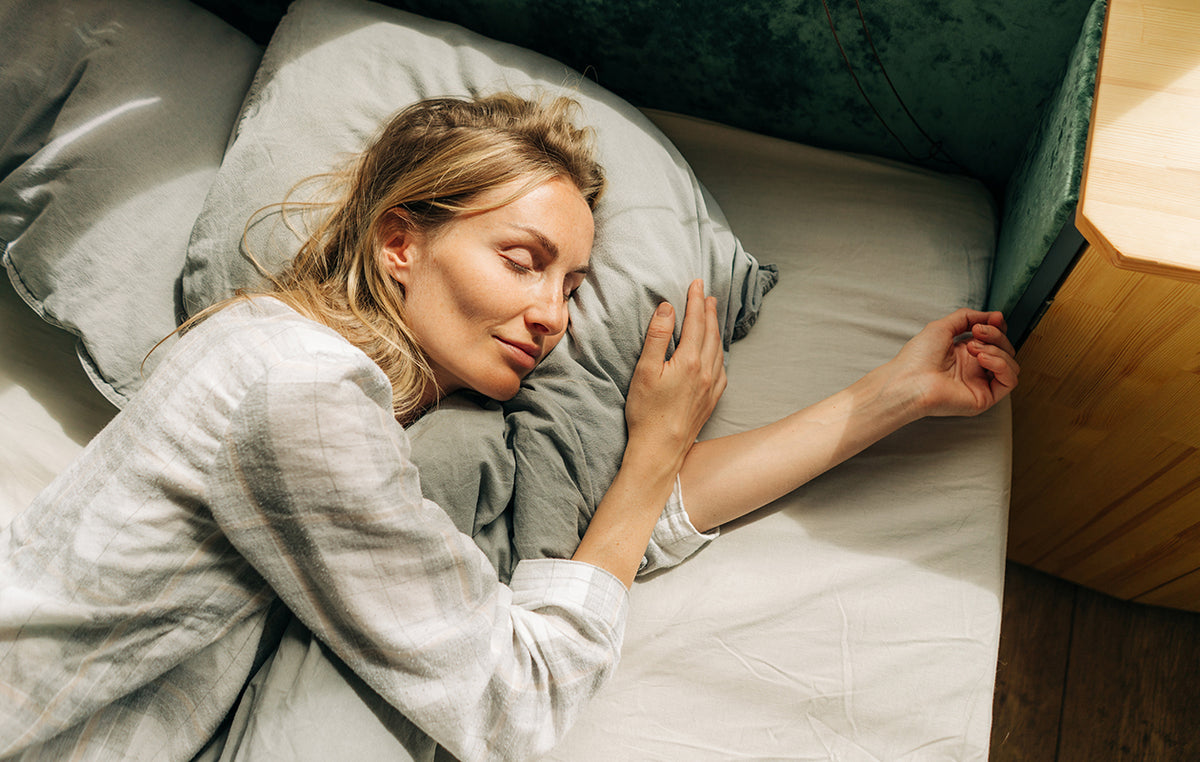
Tips for better sleep during hormonal changes

Hormonal changes can wreak havoc in your life. When you first enter perimenopause, you’re not just dealing with hot flashes, night sweats, mood swings, fatigue and irregular menstrual cycles. One of the biggest complaints is sleeplessness.
Sleeplessness is marked by the inability to fall asleep and stay asleep. While your husband or partner can fall asleep within five minutes of their head hitting the pillow, you find yourself staring up at the ceiling. Or, after falling asleep you have a difficult time staying asleep through the night. One or two nights each week with interrupted sleep can leave you feeling worn out.
However, if you used to be able to fall asleep relatively well in the past, then it’s possible that your bouts of sleeplessness are related to hormonal imbalance and your body is trying to adjust to this new perimenopausal phase in your life. Hormonal imbalance can make it hard to fall asleep or stay asleep at night, but there are things you can do if you’re in perimenopause or menopause and prone to being wide awake when you should be sleeping soundly.
How to get better sleep
• Cut out caffeine: If you love your coffee and sodas that contain caffeine, try switching to decaf. Decaf still actually has a very small amount of caffeine, but not nearly what you used to consume. Caffeine can stay in your system and make you sensitive to falling asleep because it’s a stimulant and can keep you up at night.
• Exercise: Try setting aside time each day to exercise. When you do, remember to challenge your body. If you ordinarily go for 20-minute walks, make it 30 minutes the next day. Rigorous cardio can make you tired at night and keep your heart rate up. It is also important not to exercise close to bedtime because excess activity before hitting the hay can make you “wired,” potentially challenging your ability to fall asleep.
• Eat for sleep: Consume foods that can help you get sleepy at night. According to research1, this not only includes cutting out caffeine but also limiting alcohol which can disturb sleep patterns. It is also suggested that including more fatty fish or foods that contain vitamin D and omega-3 can be helpful. Likewise, eating foods that contain melatonin, a specific amino acid such as tryptophan, plus minerals like magnesium and zinc can also improve sleep significantly. Some foods that contain melatonin include tart cherries, corn, tomatoes, pomegranate, olives, grapes, broccoli, cucumber, rice barley, rolled oats, walnuts, peanuts, sunflower seeds, mustard seeds and flax seeds. Magnesium is a key and powerful mineral that helps with sleep and relaxation. Foods that contain magnesium are dark leafy greens (baby spinach, kale, collard greens), fish (salmon, halibut, tuna, mackerel), wheat germ, nuts and seeds, bananas, avocados and low-fat yogurt. Additionally, foods with tryptophan (amino acid) can make you tired enough to snooze at night. Tryptophan can be found in dairy, poultry (turkey, chicken), seafood, nuts and seeds, legumes, tofu, fruits, vegetables and grains.
• Avoid naps2: Another recommendation is to avoid napping in the afternoon because it can disrupt your ability to fall asleep at night.
• Relax before bed: It’s crucial that you designate time to unwind before bedtime. This includes practicing good sleep hygiene by avoiding screens like televisions, tablets and smartphones for at least 1 hour before bed. Some of the ways you can relax are reading a good book, playing soothing music, taking a warm bath and drinking a glass of warm milk or chamomile tea before bed. Warm milk contains melatonin, which can make you fall asleep easier.
• Keep your room cool: Ensuring that your room is kept at a cool temperature can improve your sleep. According to sleep experts3, the best temperature for a good night’s rest is around 65 degrees.
• Try Amberen: AMBEREN PERIMENOPAUSE RELIEF CAPSULES offer multi-symptom relief including occasional sleeplessness. 82% of perimenopausal women who participated in our clinical trial reported to have slept better. However, Amberen Perimenopause is not a sleep aid supplement.
• See your doctor: If you have a history of sleeplessness, or are experiencing more than occasional sleeplessness, talk to your healthcare provider to determine what options are right for you.
Final thoughts
If sudden hormonal changes in your body have you suffering from occasional sleeplessness, you’re not alone. Many perimenopausal women complain about sleeplessness when they first enter perimenopause. In addition to taking Amberen Perimenopause, lifestyle choices can help improve your quality of sleep. Obtaining adequate sleep is vital because it can help improve cognitive skills and memory, boost productivity, reduce the chances of getting sick, give you energy and even benefit your mood. Leading a mindful lifestyle that includes proper sleep hygiene is an important step to ensuring you’re getting a good eight hours of rest every night.
1. https://www.sleepfoundation.org/articles/food-and-drink-promote-good-nights-sleep
2. https://www.sleepfoundation.org/insomnia/symptoms/sleep-tips-insomnia-sufferers
3. https://www.sleepfoundation.org/bedroom-environment/touch/what-temperature-should-your-bedroom-be
This blog post and the recommendations made herein are provided for informational purposes only and are not intended to be used as healthcare advice. Individuals are encouraged to consult their healthcare provider with questions about their specific needs. The references provided in this blog post are identified for informational purposes only and such references and the underlying research, including the entities and individuals involved in the underlying research, did not involve Amberen and are not affiliated with Amberen or the makers of Amberen.
Right symptoms. Right phase. Right relief.
Find the Amberen product that’s best suited for your specific symptoms.



